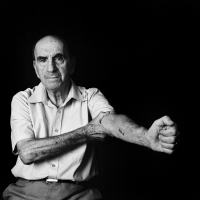 On Tuesday, April 9, 2013, the Jewish Studies program and Hillel at Ithaca College are screening NUMBERED to mark Holocaust Remembrance Day (Yom ha-Shoah). The movie will be shown in Textor 101 at 7:30 pm, and is free and open to the public.
On Tuesday, April 9, 2013, the Jewish Studies program and Hillel at Ithaca College are screening NUMBERED to mark Holocaust Remembrance Day (Yom ha-Shoah). The movie will be shown in Textor 101 at 7:30 pm, and is free and open to the public. On Tuesday, April 9, 2013, the Jewish Studies program and Hillel at Ithaca College are screening NUMBERED to mark Holocaust Remembrance Day (Yom ha-Shoah). The movie will be shown in Textor 101 at 7:30 pm, and is free and open to the public.
On Tuesday, April 9, 2013, the Jewish Studies program and Hillel at Ithaca College are screening NUMBERED to mark Holocaust Remembrance Day (Yom ha-Shoah). The movie will be shown in Textor 101 at 7:30 pm, and is free and open to the public.
During the Holocaust, prisoners at Auschwitz, both Jewish and non-Jewish, were tattooed with serial numbers, first on their chests and then their left arms. An estimated 400,000 numbers were tattooed in Auschwitz and its sub-camps; only some several thousand survivors are still alive today. NUMBERED is about these numbers and their meanings – to those who still bear them and to their families and communities.
Danna Harman, in her review of the film in the Israeli newspaper Haaretz, writes:
“Numbered,” by Israelis Dana Doron and Uriel Sinai, tells the story of survivors who, for the last six decades, have been living daily lives with the grayish-blue numbers tattooed on them by Nazis in Auschwitz. What do those numbers on the forearms mean to the people bearing them, the filmmakers set out to find out. There is no one answer, of course. For some, they are marks of shame to be hidden. For others they are badges of honor.
For many outsiders, meanwhile, these survivors have become living, walking exhibits of the Holocaust, with their trauma on display for all to see − whether they are eating an ice cream or taking money out of an ATM or just reading a book on the bench. Which immediately raises the question of how the next generations will remember those numbers when the survivors are no longer sitting on those benches.
Doron, a medical doctor and filmmaker, and Sinai, a still photographer, not only take testimony from the survivors themselves but also introduce some extreme attempts by some of the younger generation to capture these numbers, and all they symbolize, and hold onto them.
One middle-aged woman interviewed explains how her family has come to use her father’s Auschwitz number in their lives − it serves as the house alarm code, for example, the bank code, and the Internet password. When her father passed away recently, she takes this a step further, going to get his number tattooed on her ankle − with unforeseen results.
Another young man does the same with his grandfather’s number. “This is our connection,” says the grandson, posing for a photo with his elderly grandfather − each holding out an arm with the identical number etched onto it. “I don’t want it to fade.”
For more information, please contact Rebecca Lesses, Coordinator of the Jewish Studies Program, at 274-3556 or rlesses@ithaca.edu. Individuals with disabilities requiring accommodation should contact Kim Wojtanik, H&S Dean’s Office, at 274-3409 or kwojtanik@ithaca.edu. We ask that requests for accommodation be made as much as possible in advance.
https://www.ithaca.edu/intercom/article.php/20130329143024823